Rinsing gums during inflammation is both hygienic and medical procedure. In its process, food debris is removed from the interdental spaces, the gum surface is cleaned, itching, irritation, redness, and soreness are relieved. For rinsing, you can use ready-made pharmaceutical drugs, self-prepared herbal infusions, healing infusions and solutions.
Treatment includes care from the dentist and follow-up procedures performed by the patient at home. Care for gingivitis with the help of a dentist. Teeth before scaling and after 9 days. Plaque and tartar are removed. Some patients may find the bonding uncomfortable, especially if the tartar buildup is extensive or the gums are very sensitive.
Folk remedies based on chamomile and calendula
The dentist explains to the patient the importance of oral hygiene and how to brush and floss effectively. They may monitor the patient periodically and perform more frequent cleanings if necessary. It is also important to secure the teeth so that oral hygiene can be carried out effectively.
Pharmacy drugs
Very convenient and easy to use. Pharmacy infusions and rinsing solutions perfectly stop the inflammatory process, eliminate pain, burning, itching, completely disinfect the surface of the mucous membrane, eliminating pathogenic bacteria and microorganisms.
Almost everything pharmaceutical products have an antiseptic, anti-inflammatory, analgesic effect on the inflamed surface.
Possible complications from gingivitis
Some dental problems, such as crooked teeth or poorly fitting crowns or bridges, can make it difficult to properly remove plaque and tartar. What can the patient do at home? Keep in mind that in most cases, electric toothbrushes perform better job than we can do on our own.
- Brush your teeth at least twice a day.
- Wipe your teeth at least once a day.
- Rinse your mouth regularly antiseptic for rinsing your mouth.
- Ask your dentist to recommend one.
The most effective antiseptics intended for rinsing are:
- chlorhexidine(use after every meal until complete recovery);
- furatsilin(use 2-3 times a day);
- Miramistin(rinse 3-4 times a day);
- chlorophyllipt(rinse your mouth with diluted alcohol solution three times a day).
The following rinses have an excellent anti-inflammatory effect:
However, if the condition is left untreated, gum disease can spread and affect tissue, teeth and bone, leading to periodontitis. Periodontitis is a more serious disease that can lead to tooth loss due to bone loss. Moisture - mouth - gum ulceration caused by bacterial infection.
- Abscess in the gum.
- Abscess in the jaw bones.
- Infection in the jaw bone or gum.
- Repeated gingivitis.
- rotokan(rinse the gums until the inflammation goes away);
- hydrogen peroxide(dissolve 1 tablespoon in half a glass of water, rinse twice a day);
The following drugs have a pronounced analgesic effect:
- malavite(10 drops per glass of water, use for rinsing daily for a week);
- "Forest Balm"(use after each meal until symptoms disappear).
Herbal decoctions
Their preparation requires some skill and basic knowledge. medicinal herbs. The first thing you need to do at home if your gums are inflamed is to prepare a decoction that has an anti-inflammatory and analgesic effect.
This bleeding may be one of the first warning signs that you have gum disease. The mild variety is called gingivitis. When you have this, only your gums become infected. If you don't treat it, the infection can spread below the gum line and into your bone. It then becomes a more serious form of gum disease called periodontitis.
Both gingivitis and periodontitis have been shown to increase your risk of diseases such as diabetes, heart disease, osteoporosis, pneumonia and cancer. Early detection is yours best choice. You can find and address a problem before it becomes serious if you know what to look for.
Herbal decoctions cannot be stored for a long time, as they lose their properties. It is advisable to prepare fresh daily.
Some herbs have good antibacterial properties, including:
- calendula(pour 200 ml of boiling water over one spoon of flowers, let it brew, use for rinsing);
- chamomile(brew 2 spoons in a glass boiled water, rinse your mouth).
Anti-inflammatory and analgesic effects are distinguished by:
Inflammation of the gums in the expectant mother
They may also feel tender or sore and bleed easily when you brush or brush your teeth. Bad Breath: Your mouth is a nice, warm, moist home for millions of bacteria. They feed on plaques, so the more you have, the bigger the buffet. “Bacteria produce toxins that can irritate gums and teeth and have bad smell", says Sahl.
It can also be a symptom of serious gum disease. Your breathing usually doesn't change much if you have gingivitis. Gums that get smaller: If your teeth look longer than before, chances are they aren't growing - your gums are shrinking.
- sage(steam one spoon of flowers in a glass of boiling water, rinse your mouth after eating);
- yarrow(boil 2 tablespoons of inflorescences in half a liter of water for 15 minutes, strain, take oral baths several times a day).
The astringent and strengthening effects are distinguished by:
- oak bark(boil a handful of crushed bark for 30 minutes, strain, cool, use for rinsing);
- St. John's wort (alcohol infusion dilute inflorescences in water, rinse teeth and gums).
Ointments and gels
good therapeutic effect have the means local application. A cream, ointment or gel for gum inflammation provides local anesthesia, envelops the mucous membrane with a protective film, which prevents bleeding, pain, and increased inflammatory process. With their help you can get rid of itching, burning, swelling.
“The bone begins to break down, the gums begin to separate from the tooth, creating a pocket,” says Sahl. This retraction is called receding gums. Sensitive teeth: If a sip of a cold drink makes you shiver, your teeth may be telling you something. This is a sign of gum disease, which is often accompanied by shrinking gums. “With gums receding, the sensitive part of the tooth is exposed - this is called dentin, causing sensitive teeth when exposed to cold water and air,” says Sal.
Gum disease can attack the bones that hold your teeth in place, causing them to weaken or move. Periodontitis is the main cause, and it can even change the way your teeth fit together when you bite. The goal is to control your infection. Your dentist will look at what contributed to it to figure out where to start.
For gum diseases, ointments and gels must be applied to the inflamed surface at least 2-3 times a day, after rinsing the mouth antiseptic solution or herbal decoction. Let's look at the most popular and effective drugs.
"Metrogil denta"
Designed for the treatment of inflammatory processes. It has a pronounced anti-inflammatory and anesthetic effect, relieves itching and burning. Apply twice a day, first cleanse the oral cavity of food debris.
Deep Cleaning: The first line of treatment for gum disease is a thorough, deep cleaning. Unlike regular cleaning, which is usually done just above the gum line, deep cleaning goes along the gum line. Sally will also use special tools.
Your dentist may do something called a scaling. This scrapes away the tartar both above and below the gum line. She can also do something called root planing. This is when the rough surfaces of the roots of your teeth are smoothed out. This helps your gums reattach to your tooth.
"Solcoseryl"
Available in gel and ointment form. The gel is indicated for open abrasions, wounds, ulcers, ointment - for closed inflammatory processes. Contributes speedy regeneration mucous membrane, has an anesthetic effect. Apply 2-3 times a day.
"Dental"
It is effective thanks to the corn oil it contains, which envelops the inflamed surface with a protective film. Helps to remove painful sensations, has healing properties. Apply with massaging movements 3-4 times a day.
What are the reasons for the development of inflammation?
Both methods may require more than one visit to the dentist. Medicine: no magic pill or cream, which can treat gum disease, says Sahl. However, your dentist may prescribe medication as part of your treatment. Antiseptic microchip or antibiotic microspheres: You insert these tiny gels or particles into pockets in your gum and they gradually release medications over time to reduce the size of the pocket and get rid of bacteria.
"Holisal"
Instant action analgesic, antimicrobial, anti-inflammatory gel. Relief is felt a couple of minutes after application and lasts for several hours. Rub into the surface of the gums 2-3 times a day for 5-7 days.
"Asepta"
A drug with a pronounced antimicrobial, antipruritic, analgesic effect. The propolis included in its composition provides an antiseptic effect, helps restore damaged tissue, and prevents bleeding gums. It is used not only for treatment, but also for prevention inflammatory diseases oral cavity.
Antibiotic gel: You spread this on the gum pockets after deep cleaning to help control the infection. Enzyme suppressor: You take this tablet after a deep clean to block certain enzymes in your mouth from breaking down gum tissue.
What medications help if your gums are inflamed?
Oral antibiotics: For more serious infections, you can swallow these capsules or tablets. Surgery: If deep cleaning can't solve the entire problem, you may need to go deeper to fix it. Gum graft surgery: The surgeon takes tissue from another part of your mouth and covers any exposed tooth roots to prevent bone loss or decay and help sensitive teeth.
Toothpastes
Anti-inflammatory toothpastes for gums
Quick treatment of gum inflammation at home is impossible without the use of special toothpastes that are both hygienic and medicinal properties. They cleanse the oral cavity well of food debris, destroy pathogenic bacteria, strengthen the gums, and prevent their bleeding.
Flap surgery: Your gums are lifted so the surgeon can reach deep below the gum line. She then stitches your gum in place so it fits snugly against your tooth to prevent more tartar from forming. Your dentist may also recommend an antimicrobial mouthwash. You swish this around your mouth as part of your daily brushing routine to help control bacteria. It is available both over the counter and over the counter.
Medications for treating gums
American Academy of Periodontology: "Periodontal Disease and Systemic Health", "Gum Disease and Others" systemic diseases", "Gum symptoms", "Gum surgery". National Institute of Dental and Craniofacial Research: “Periodontal Disease: Causes, Symptoms and Treatment.”
Dentists do not recommend using medicinal pastes constantly; the course of treatment should not exceed one month, then you should take a break.
Pharmacy hygiene products include active ingredients, herbal extracts, antiseptic and anti-inflammatory compounds. The most popular toothpastes for gums are Parodontax, Lakalut, and President.
American Dental Association: "Gum Disease." American Dental Association: “Scaling and Root Structure.” About 40% of all adults suffer from periodontitis - often without knowing it. The disease develops slowly and often without pain or visible signs. The sooner it is diagnosed and treated, the better.
Healthy gums are pale, pink and firm. The tough tissue covers the bone and fits tightly to the tooth, like a collar. There is no bleeding when you brush or floss your teeth. A sticky film called bacterial plaque constantly forms on your teeth. If you don't brush properly, plaque will be left behind, especially between teeth and along the gum line. When plaque accumulates in these areas, it causes gum inflammation. Inflamed gum tissue is characterized by redness and swelling. you brush your teeth.
"Parodontax"
Combines fluoride, mineral salts, active ingredients, herbal components. It contains echinacea extracts, peppermint, sage, myrrh, chamomile, ratania. Prevents bleeding gums, helps relieve the inflammatory process. Recommended for daily use by adults and children over 12 years of age.
If plaque is not removed, it grows in the gaps between the teeth and gums. On the surface of the tooth root, the plaque hardens into tartar, which has rough surface, where bacteria attach even more easily. As the supporting bone gradually erodes, the tooth loses more attachment. Inflammation of the gums turned into periodontitis. This is a slow process that often goes unnoticed and without pain. Over time, the tooth will become loose and, in the worst case, may be lost.
There is a lot you can do to prevent and reverse periodontal disease through proper oral hygiene. Once a day, also clean between your teeth using interdental brushes, dental flossers, a mini flosser, or dental floss. You may also need special toothbrush for cleaning hard to reach areas. Ask your dentist or dental hygienist for tips and instructions.
"Lakalut"
It has anti-inflammatory, antibacterial, anti-caries effects, helps strengthen tooth enamel and gums, and remove plaque. Used for the treatment and prevention of oral diseases (gingivitis, periodontitis, stomatitis, caries). It is recommended for use as a therapeutic course: use Lakalut paste for 30 days, then take a break for 2-3 months and conduct a course of therapy again.
If you suspect gum disease, contact your dentist. Collaboration between you and your caregiver is paramount to a successful outcome, even after treatment is completed. Regular checkups, combined with your own home care, are critical to preventing problems from returning.
Gingivitis = inflammation of the gums. Periontonitis = loss of alveolar bone. We've all experienced unexpected pain and throbbing pain in our gums at one point or another. So what do you do when you are short term and need quick elimination? Here are four dentist-approved home remedies to relieve gum pain and mouth irritations.
"PRESIDENT"
Medical toothpaste on an emulsion basis, is effective in the treatment of gum inflammation, has an anti-caries, anti-inflammatory, antifungal, regenerating effect. It contains propolis and hexetidine. Use daily, morning and evening.
Pills
To treat gum inflammation, antibiotics, immunocorrectors, antihistamines, vitamins, microelements. Complex treatment The disease includes a combination of various medications, as well as the use of folk remedies to combat the inflammatory process.
Prevention of such violations
Heat helps improve circulation and increases blood flow to a specific area. Then wrap the ice pack in a thin towel and press it against your face for a few minutes or until the area is slightly numb. Cold helps reduce pain along with inflammation and swelling. Repeat this cycle 2 or 3 times to achieve best results. Rinse the salt with water. Add ½ teaspoon of salt to a glass of warm water and use it to rinse your mouth thoroughly twice a day until the pain or swelling goes away. Salt naturally helps fast healing and effectively inhibits the growth of bacteria in the mouth to prevent infections. Plus, this rinse can remove food particles that are stuck between your teeth! Turmeric paste. Mix ¼ teaspoon of turmeric powder with a little water to make a paste and apply to the affected gums with a clean finger. Leave it on for 5 minutes, then massage lightly for 1 minute and rinse your mouth warm water. Turmeric is a natural substance containing curcumin, which has antioxidant properties that help reduce pain, swelling and inflammation of the gums. You can easily find it in your kitchen or local grocery store. Use tea bags. Steep tea bag in boiling water for 2-3 minutes. Remove it and let it cool before gently holding the tea bag on the affected gum area. Keep it there for five minutes. The tannic acid and anti-inflammatory benefits of tea quickly relieve gum irritation and discomfort. Applying a tea bag directly to your gums is much more effective than drinking tea, which can also stain your teeth.
- Warm and cold compresses.
- Soak a clean cloth in warm water and squeeze out excess liquid.
- Hold the compress against your face on the affected area for five minutes.
Antibiotics
When gums become inflamed, pathogenic bacteria actively multiply in the patient’s mouth, and they are used to combat them. antibacterial drugs wide range actions.
You cannot decide on your own to take antibiotics; they can only be prescribed by a dentist!
Antibiotics have indications and contraindications, so only the doctor has the right to decide on the therapeutic dose, duration of treatment, and recommended medication. When self-medicating, there is a high probability of overdose or taking inappropriate pills.
The most commonly prescribed drugs are:
- lincomycin;
- clindamycin;
- glycosamide
These are modern antimicrobial agents wide spectrum of effects of the lincosamide group. They are easily tolerated by the human body and usually do not cause side effects.
Immunocorrectors and antihistamines
The main purpose of immunocorrectors is to enhance protective properties human body, casting immune system in "combat readiness". For inflammatory diseases, Imudon, Transfer Factor, and Ribomunil are often used. They have anti-infective, anti-inflammatory effects, activate the body’s immune responses, and are effective for diseases of the oral cavity and ENT organs.
Antihistamines are prescribed simultaneously with antibiotics to prevent the occurrence of allergic reactions. Diazolin, tavegil, Erius, fenistil are effective and do not cause a sedative effect.
 Replenishing the body with vitamins and microelements will strengthen the gums and reduce bleeding One of the causes of gum inflammation is a lack of vitamins and microelements in the body. To treat the disease, the doctor must prescribe special vitamin complexes, which contain vitamin C. It helps strengthen the gums, reduce bleeding, and prevents the intensification of the inflammatory process.
Replenishing the body with vitamins and microelements will strengthen the gums and reduce bleeding One of the causes of gum inflammation is a lack of vitamins and microelements in the body. To treat the disease, the doctor must prescribe special vitamin complexes, which contain vitamin C. It helps strengthen the gums, reduce bleeding, and prevents the intensification of the inflammatory process.
Taking ascorutin, which contains ascorbic acid and rutin, has a good effect.
We told you how to relieve gum inflammation at home and what products you need to use. It only remains to add that it is advisable to consult a dentist before starting treatment in order to avoid undesirable consequences self-medication.
Gum inflammation is a fairly common disease that occurs in both adults and children. Today many people complain about increased sensitivity and bleeding gums. When your gums become inflamed and bleed, your mood plummets. And there is a reason. Not only does a smile with inflamed gums look, to put it mildly, unattractive. Yes, also painful sensations, and bad breath. AND toothache may happen. Why is it here? good mood be? And when you think that inflammation of the gums can lead to loss of teeth, the melancholy overwhelms you.
Gum inflammation
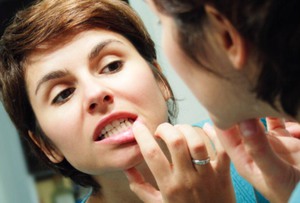 If you feel that there is swelling of the gums, pain, blood, painful sensations when eating hard, hot or cold food, and sometimes suppuration at the base of the teeth or their loosening - a sign of one of the inflammatory diseases oral cavity.
If you feel that there is swelling of the gums, pain, blood, painful sensations when eating hard, hot or cold food, and sometimes suppuration at the base of the teeth or their loosening - a sign of one of the inflammatory diseases oral cavity.
Gingivitis - initial stage inflammation the surface of the mucous membrane of the gingival papillae between the teeth or the edge of the gums near the tooth. It manifests itself in the form of increased sensitivity, pain, redness, swelling and bleeding of the gums, sometimes the pain radiates to the temple or ear.
The cause may be damage to the mucous membrane when eating, brushing teeth, or traumatic installation of fillings, dentures, crowns or braces. May occur in those who have malocclusion or short bridle lips.
Gingivitis is a fairly common disease, the treatment of which must be taken seriously. If left untreated, gingivitis can progress to the more serious disease periodontitis.
Gingivitis can occur as an accompaniment of the underlying disease, which should be treated first.
Also found gingivitis during pregnancy, which may be accompanied by swollen gums, bleeding, the appearance of pus and bad breath. Painful sores may appear and the temperature may rise.
Gingivitis in children occurs if the rules of oral hygiene are not followed or the mucous membranes in the oral cavity are injured, as a result of which microbes enter it, causing inflammation. The reason may also be lack of vitamins and minerals in the body and during teething. Children's gingivitis is treated in the same way as in adults, but in more gentle ways.
Periodontitis
Periodontitis is usually considered advanced gingivitis. It is accompanied by tooth mobility, periodontal pockets appear with leaking pus, the bone around the teeth atrophies, periodontitis penetrates into the bone, and the roots are exposed. If you don't timely treatment Over time, the teeth will fall out.
With these diseases, gum inflammation occurs in the area of either single or all teeth.
Periodontal disease
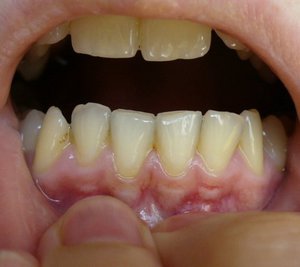
Periodontal disease occurs as a result slight or uneven load on teeth. Accompanied by slight bleeding, usually without pain, and a small amount of tartar. It develops slowly, but if left untreated, leads to periodontitis. Most often found in older people.
Bleeding gums independent disease is not. Most often observed when brushing teeth as one of the symptoms of gingivitis or periodontitis.
If the gums become swollen due to periodontitis, which is caused by an infection in the tooth canals, it is useless to treat gum inflammation. Necessary fill root canals.
If your gums are injured as a result of incorrect, traumatic installation of fillings, crowns, dentures or braces, you should first consult a dentist to eliminate the cause. Without this, gum treatment will not be effective.
Causes of gum inflammation
Usually distinguish internal and external reasons the occurrence of gum inflammation. TO external reasons as a result of exposure include:
- poor oral hygiene or its complete absence or improper care;
- presence of tartar;
- improper installation of fillings, dental crowns, prosthetic braces;
- malocclusion;
- smoking.
Internal reasons are:
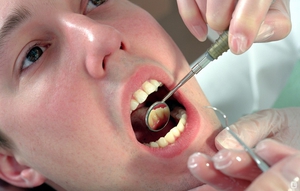
- diseases internal systems and organs (gastrointestinal tract, cardiac, hematological, diabetes mellitus etc.);
- immunodeficiency;
- lack of vitamins in the body;
- medications taken;
- genetic problems;
- sometimes pregnancy.
That is, most often gum inflammation associated with dental infection or other pathology of the human body. It may lead to serious complications and disorders in the body.
Treatment options at home
Gum inflammation can be treated using different ways. In any case, in order not to harm health and prevent the development of more serious illnesses Before starting treatment, you must consult a dentist to determine the diagnosis.
In serious cases, the doctor will prescribe treatment, in combination with which additional home remedies will provide a good effect.
In simpler cases, it is enough to use at home products that provide anti-inflammatory, antiseptic, decongestant and analgesic effects.
When talking about ways to treat gums at home, there are: medicinal products pharmaceutical (medicinal) and folk.
Pharmacy products
Pharmaceutical products include rinses, sprays, applications, toothpastes and gels. All pharmaceutical preparations are supplied with instructions for use, which must be followed and followed in order to obtain the desired result.
Modern pharmacology has created on the basis of healing natural remedies And medicinal plants natural safe and effective drugs.
For bleeding and inflammation of the gums, various pharmaceutical products are used that relieve inflammation, relieve pain, eliminate bleeding, itching and burning, relieve swelling and disinfect the mucous membrane from microorganisms and bacteria.
Antiseptic rinses include:
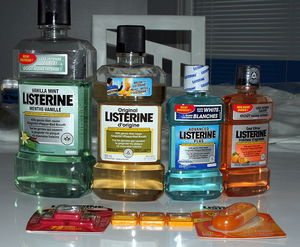
- Listerine (2 times a day for 30 seconds) is one of the most effective rinses.
- Stomatophyte (3-4 times a day for 10-15 days).
- Furacilin (2-3 times a day).
- Chlorhexidine (spray 0.2% for periodontal disease and 0.05% for childhood gingivitis - after each meal until recovery).
- Miramistin (3-4 times a day).
- Chlorophyllipt (3 times a day with a diluted solution).
- Rotokan (until inflammation is eliminated).
- Hydrogen peroxide (solution 1 tbsp in 100 ml of water 2 times a day).
- Malavit (10 drops/glass of water for rinsing 1 week daily).
- “Forest balm” (after each meal until symptoms disappear).
The effect of treatment with rinses can be enhanced by using compresses and applications in parallel. medicinal pastes, gels and ointments.
Therapeutic gels and ointments form a protective film on the mucous membrane. They are applied to the gums several times a day, after rinsing. The most effective means:
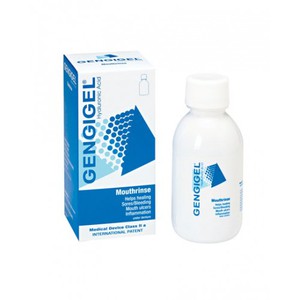
Special toothpastes have also proven effective in the treatment and prevention of bleeding and inflammation of the gums. They contain extracts of medicinal herbs and anti-inflammatory ingredients. For gum inflammation, it is recommended to use toothpastes:
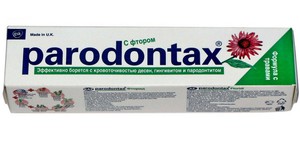
Folk remedies for treatment
To get really positive healing effect and the disease has not progressed, before deciding how to treat gum inflammation at home, it is recommended to consult a specialist not only to establish a diagnosis, but also, if necessary, to do cleaning, remove tartar and get basic prescriptions.
Typically, application folk remedies has centuries of experience. Medicinal plants as in pure form, and in combination with other plants, are increasingly used for the prevention and treatment of diseases of various etymologies. An important advantage of medicinal plants is their low toxicity and lack of side effects in most cases.
Typically you will need to prepare infusion, decoction or alcohol tincture based on medicinal plants for rinsing the mouth, preparing compresses or medicinal applications.
Medicinal herbs have antibacterial (calendula, chamomile), anti-inflammatory and analgesic (sage, yarrow), astringent and strengthening (oak bark, St. John's wort) properties.
For simple inflammation, rinsing with a decoction or infusion may be sufficient. But herbal infusions They do not last long, it is advisable to cook them daily. Most effective and safe sage, burnet, yarrow, chamomile, calamus, oak bark, sorrel, St. John's wort, linden blossom, calendula, eucalyptus and many others.
Below are some of the most simple recipes treating gums with home remedies.

First aid for gum disease
In case severe pain To treat gums at home before visiting a doctor, it is recommended to rinse your mouth with the following solutions:
- potassium permanganate;
- baking soda;
- chlorhexidine;
- furatsilina.
Or use ointments that will reduce bleeding gums, have an antiseptic effect and reduce pain.
The main thing is to under no circumstances resort to radical ways self-medication, as this may cause more serious consequences. In order to stop the spread of inflammation, it is best apply various infusions, having antimicrobial effect. The pharmacy sells such highly effective products as Stomatidine, Mevalex and Givalex without a prescription. They should be used according to the recommendations included in the package.





